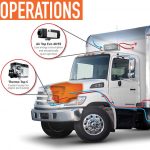In the last few years, winter weather has hit harder than ever before, meaning that it’s not too soon to start preparing for inclement weather. The first step is to prepare your fleets and everyday operations for winter.
Specific concerns that come up with cold weather include vehicle maintenance, frozen vehicle parts, fuel, and road closures. These concerns require changes in everyday operations and preparation now. So with shorter days, colder weather, and leaves already falling to the ground, what should fleet managers and drivers do to prepare their fleets?
Here are some things to keep in mind:
- Make sure crucial systems such as the brakes, battery, tires, windshield wiper blades, deicing washer fluid, and oil levels are all operating properly before the season begins. Properly servicing and maintaining vehicles before and during the winter season helps keep fleets up and running throughout a long winter. This is particularly critical as once the season begins, demands for repair and support crews will rise, so any preemptive measures taken save drivers a long wait in cold conditions.
- Each day should begin with a complete inspection of your vehicle so that any potential issues can be noticed and fixed early. This should include checking the vehicle for frozen components such as trailer doors, power cords, etc. This simple daily vehicle inspection keeps vehicles running on schedule while putting safety first.
- Change your fuel habits. Maintain at least a half tank of gas during winter season so that condensation doesn’t build up in a nearly empty gas tank in freezing temperatures. This coupled with the correctly blended fuel prevents fuel lines from freezing.
- Since it may take hours for snow plows to reach a stranded vehicle in a severe storm, drivers should always have an emergency supply of water, non-perishable food, extra clothes, and blankets in case of a vehicle breakdown. Winter weather preparedness kits should also include an ice scraper, shovel, hand warmers, first aid kit, jumper cables, and sand or kitty litter for traction.
Early preparation is especially important considering how long winter can sometimes stretch. Companies need to be ready for a winter that extends for more than a couple of months; just this year, the continental US had its coldest April in more than two decades. Ultimately, preparing early and getting drivers involved and knowledgeable about operational changes will keep the whole company on its toes, ready for any extreme winter weather that may hit.
ABOUT THE AUTHOR
Chris Ransom is the director of solutions engineering at Verizon Connect. Find out more, visit www.verizonconnect.com.
MODERN WORKTRUCK SOLUTIONS: DECEMBER 2018 ISSUE
Did you enjoy this article?
Subscribe to the FREE Digital Edition of Modern WorkTruck Solutions magazine.





